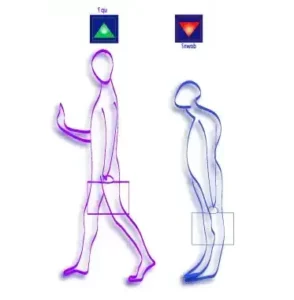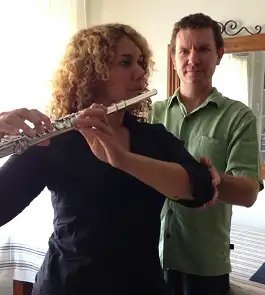Do you avoid playing and practising because it’s not comfortable?
If you are one of many musicians who have lost the comfort and joy of playing your instrument, the Alexander Technique can help you regain it.
I still play piano professionally and understand the stresses involved in performing, practising, and learning a new piece before a deadline. And with the knowledge and ability to be comfortable in my body and mind while doing these things, I don’t harm myself in the process.
If you can stay relaxed while playing, then playing will be a comfortable experience. And if you’ve learnt to play a violin, clarinet, or trumpet, then you can also learn the Alexander Technique and apply it to your playing, as the approach is the same – learn the relevant technique; practise it when you can, as well as you can; be patient as you gradually improve. Then you can be as skilled using your body as you are using your instrument, and the combination is a powerful one.
Recovery from injury
Overuse injuries are common in the music world. Neck and jaw complaints, shoulder and arm pain, and sore backs are often seen as an inevitable part of long-term playing. It is often mis-use, rather than overuse, that is the problem. The Alexander technique helps by looking at how the musician is holding and moving themselves while at their instrument, and teaches them to lessen any mis-use they have developed. Injuries cease to be reinforced every time the musician plays, and the body gets a chance to heal over the long term and not just between practice sessions.

For the trombone or clarinet player, a tensed shoulder may come to feel habitual and perhaps even necessary when holding their instrument. With awareness and practice, the player can learn to free and release their shoulder when playing. Over time this will relieve the associated pain. For all musicians, removing the mis-use in the body when playing allows for freedom and health to return, and offers the best conditions to play pain-free.
Injury prevention for musicians
Learning the Alexander Technique can help recovery from injury for those already in pain, and help prevent the return of that pain. Ideally, the best time to learn the technique is before any pain or injury has developed.
By learning to play in as free a way as possible, the body is not subject to the mis-uses which characterise the common injuries for musicians; by learning to have a lengthened spine when playing piano, the student should not develop any pain associated with the slightly slumped posture which is commonly seen; and by learning to not tense in the neck and jaw, the flautist should remain free when playing and so avoid gradually growing into a tensed and stiffened posture in the neck and upper back.
Through learning to use their bodies well when playing, musicians grow into a free and open posture, giving their bodies the best chance to work well and be not just pain-free, but comfortable and at ease .
Improved quality of performance
The pianist who sits at the piano with tense arms and stiff shoulders not only increases their risk of injury but also compromises the quality of their playing. Any unnecessary tension throughout their body will interfere with their ability to produce the best sound possible, and if they have played this way for a long time it will be difficult to recognise and change. This is the same for the flautist, the trumpet player, the cellist, the drummer and the conductor.
The Alexander Technique teaches people to hold and move their bodies as efficiently as possible. For musicians, this means they are free to express themselves through their instrument as thoroughly as possible. Any habitual tension will restrict their ability to play their instrument freely, and this will be heard in their playing. Removing this allows for a freer and more enjoyable experience when playing, whether at the Opera House, the community hall or the lounge room.

“I highly recommend Bradley as an Alexander Technique teacher as I have benefited from his expertise, knowledge and interest in my general well-being and development. Bradley has enabled me to develop an awareness of habits that have prevented me from reaching my full potential as a flutist. The results are outstanding! I have reduced body and mental tension and subsequently, the quality of my playing has improved dramatically! I would encourage Alexander Technique study with Bradley to musicians, dancers, athletes, or to anyone who would like to move efficiently, freely and without pain.
— Marie Heinrich, Flute, Sydney
My articles for musicians
Musicians and their injuries: overuse vs misuse